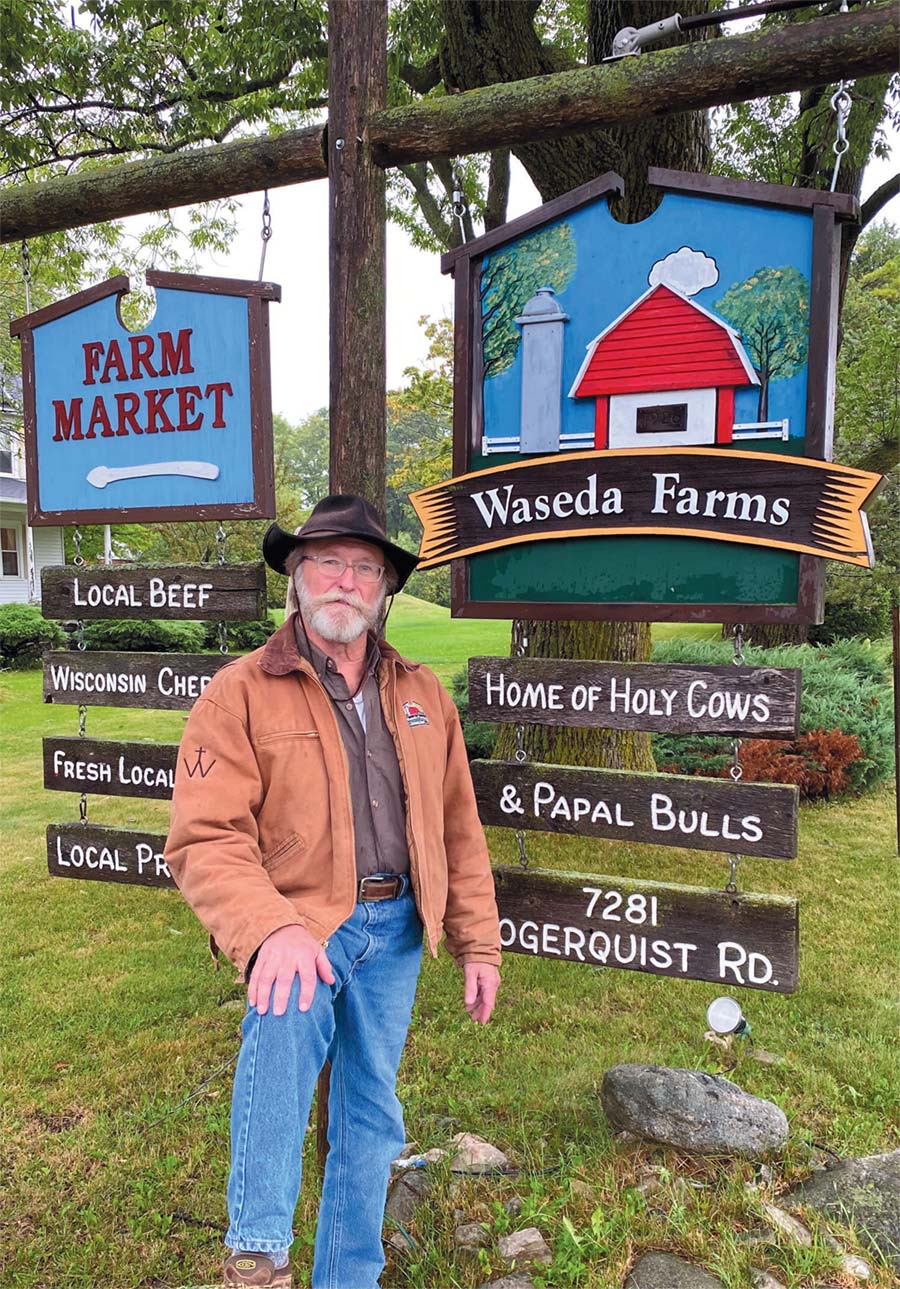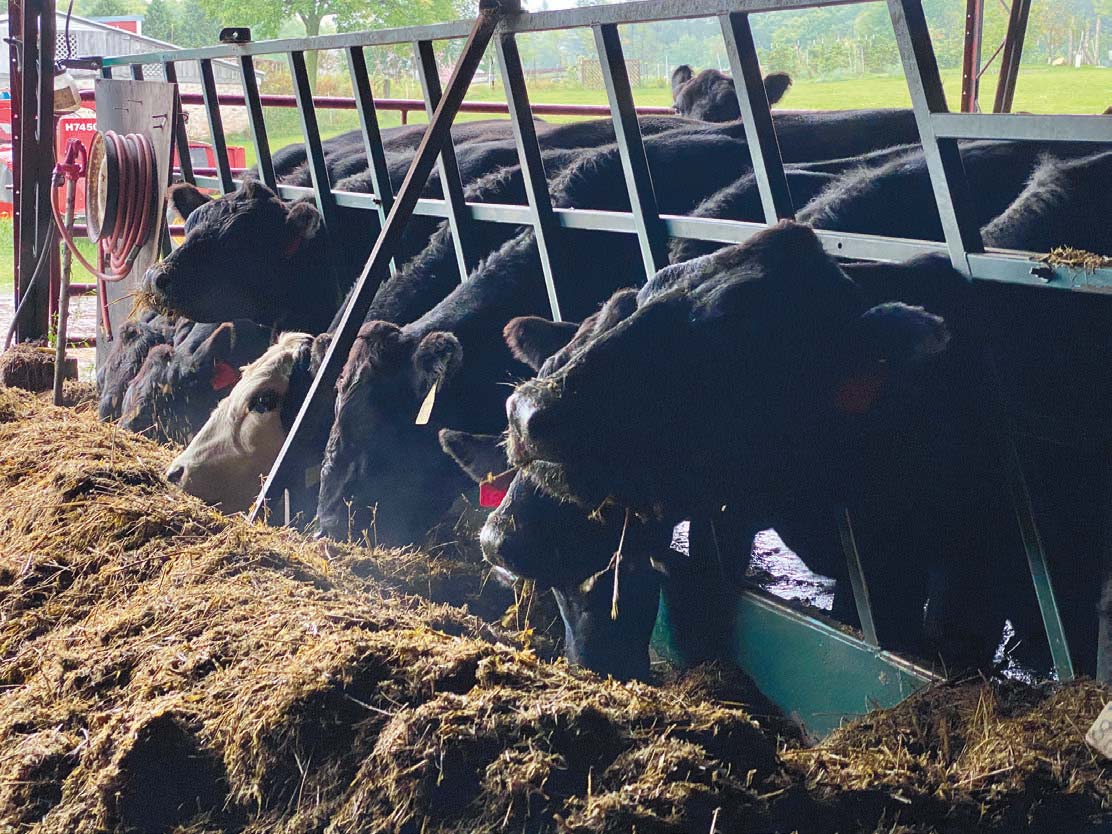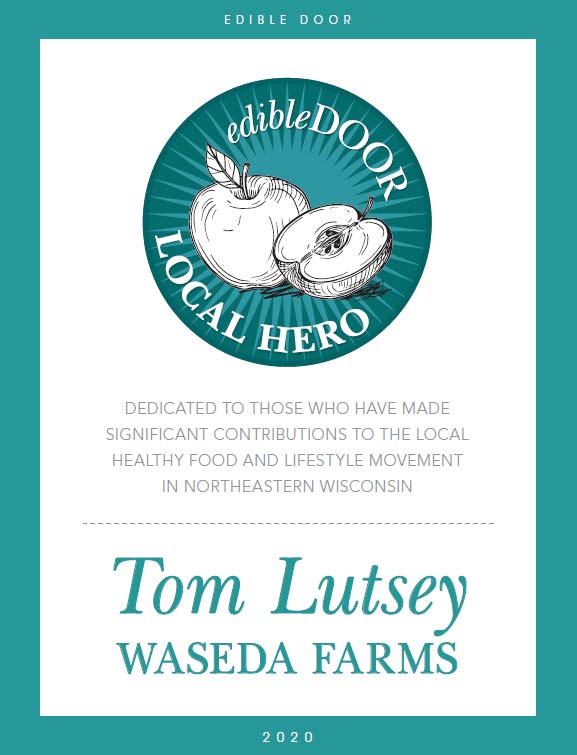Edible Door Names First Hero
The premise of the (scholarship) program is “supporting the future of agriculture through education.”
With this issue, Edible Door is joining with a number of other Edible Communities publications across North America that recognize those who are making a difference on the local food scene. The process for selecting Edible Door’s Local Hero Award began with you. Nominations continue to be taken for selecting future honorees.
“The fact that the nomination comes from you, our readers, makes this award all the more meaningful to the recipients,” said Jon Gast, Edible Door editor and co-publisher.
The first Edible Door Local Hero Award is being presented to Tom Lutsey, who founded Waseda Farms in Door County in 2008.
At the center of Waseda’s organic product line is beef, the quality of which is linked directly to a more humane, stress-reduced method for handling of livestock. It led to his relationship with Mary Temple Grandin, one of the world’s renowned experts on animal behavior, and the installation of one of the first Grandin animal handling systems in the area.
An organic product line and humane animal handling are just a couple of reasons why Lutsey is having a positive impact on the area food scene and is worthy of the award. His dedication to the continuation of Thomas H. Lutsey Waseda Farms Scholarship program, administered through the family’s foundation, is yet another.
The award is named for Lutsey’s father, a dairy farmer who founded Gold Bond Ice Cream.
The premise of the program is “supporting the future of agriculture through education.” Graduating high school students are selected for four-year, $10,000 scholarships each year. So far, almost $800,000 has been awarded to 118 students since the start of the program in 1986. Lutsey was kind enough to answer some questions related to his passion for agriculture.
WHERE DID THIS PASSION BEGIN?
My father, Tom Sr., was a dairy farmer. While he left and moved on to milk and ice cream from farming at an early age, I think there has always been something in him and me that was drawing us back to the land and agriculture. He always wanted us to own a farm, and we have for 50 years.
My intro into organic farming was very personal, similar to a lot of people I speak with. Following cancer treatment (for non-Hodgkin’s lymphoma), my oncologist/dietitian told me I should limit my intake of red meat. This was not going to work for me. A compromise was eating meat that was free of hormones and antibiotics (covered by “certified organic”). I was very fortunate to be able to partner with my neighbor and now close friend Kevin Kiehnau to help me raise my first six steers. His knowledge and experience as an Organic Valley Cooperative dairy farmer were invaluable to us getting started.
Waseda and our farm family and our products have evolved, adapting to our strengths and weaknesses and our community’s needs. As we all always need lots of vegetables with our meats, Sharon Lutsey, farm matriarch, designed and got the initial two-acre garden started with greens and tomatoes and raspberries and lots more. Additionally, the more we grew, the more demand from the community there was for other organic food, including later pork, chicken and eggs. We keep thriving to evolve to the needs of our customers and neighbors.

Tom Lutsey at the entrance to the home of the holy cows and papal bulls, a light-hearted description that Lutsey said came from the clergy of the diocese that formerly owned the land where Waseda Farms is now located. Photo by Leslie Gast

Lunch time on the farm. Photo by Leslie Gast
WHAT HAVE YOU LEARNED ABOUT AGRICULTURE?
In some ways this type of agriculture – organic, holistic, regenerative – is easy, if you are doing it right, because nature is doing all the work for you. For example, we have found using organic fertilizers for robust soil health, rather than aggressive and laser-focused insecticides and herbicides to fight singular crop problems, works better in the long-term.
In some ways this type of agriculture is signifi cantly harder. It takes three years for fields to become “Certified Organic” and ready for our animals to eat. Organic grass growth and organic yields are generally slower and lower. Finding the right price points in which we can sustain operations and keep our products affordable for everybody who needs them remains a big challenge.
What we’ve learned about agriculture as much as anywhere we’ve ever worked is that it takes a team. We have an incredible farm family. And we couldn't do it without the help and equipment and sweat of our neighbor farmers (I'm thinking of the Bleys, Haberlis, Chewy and Joe Biwer, and many others who have helped us in times of need!).
HOW RECEPTIVE HAS THE PUBLIC BEEN?
We are thrilled and have been fortunate to work with wonderful local farmers, customer-friends and with like-minded restaurants and small grocery store partners. The business has managed to grow over the last 15 years. Through the tourists that come to our store, we’ve gained regional recognition and ship around the country. We do love this business.
HOW DID THE FOUNDATION BEGIN?
We started the Lutsey Family Foundation in order to help the local communities around which we live. We place strong emphasis on children and people in need who can’t help themselves. This year feeding people is our biggest concern. We star ted the Thomas H. Lutsey/Waseda Farms Scholarship because he always felt that children from farms had a hard time getting to higher education. We specifi cally try to continue to fi nd ways to further this legacy in Brown and Door counties.
HOW DO YOU SEE THE FUTURE OF FARMING? REASON FOR HOPE?
I think all of Door County farming could become organic. What a great selling point for the tourist business of all of Door County.
This has been an incredibly challenging year for us all. Seeing our farm family work and fight through Covid-related difficulties gives me hope. Witnessing our friends and neighbors rally to support us, and all of our Door County farms, is a blessing and a privilege.
WHAT'S THE MOST ENJOYABLE ASPECT OF OPERATING WASEDA FARMS?
Working with a diverse, fun, smart, dedicated team is key, and they make it worthwhile. At the farm, our leaders Mike (farm manager), Heidi (hen house / eggs), Sayard (farm store) and Dave (garden) are passionate, and we are incredibly lucky to have found them. The meat and logistics team in De Pere (Steve, Jess, Lisa) work through hundreds of challenges each week. We think of this entire group as family and the teamwork to make this all happen always brings me joy when I'm eating our veggies ... and especially my beloved pork chops.
- If there is someone you’d like to nominate for the Local Hero award, please email your nominations to info@edibledoor.com with some background information for why you think the nominee is worthy of the award.





